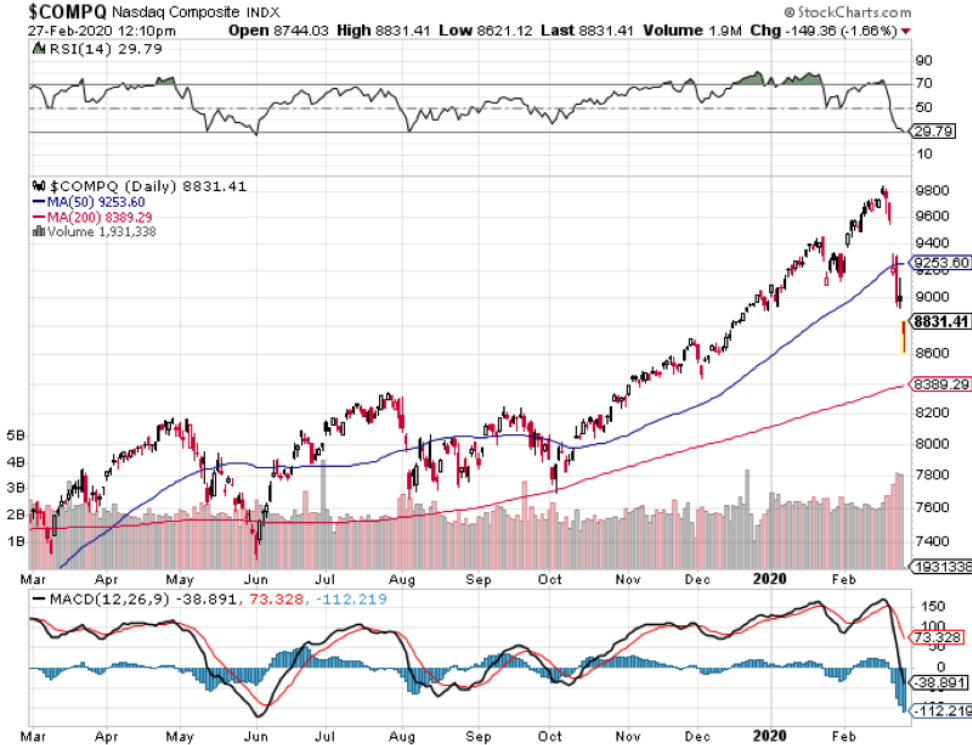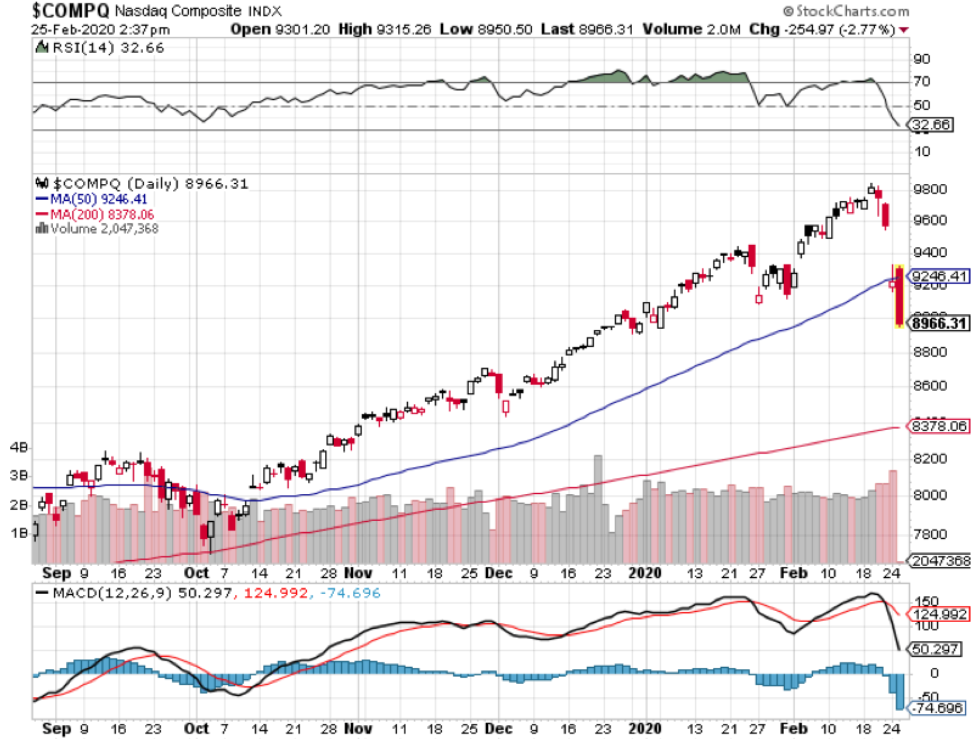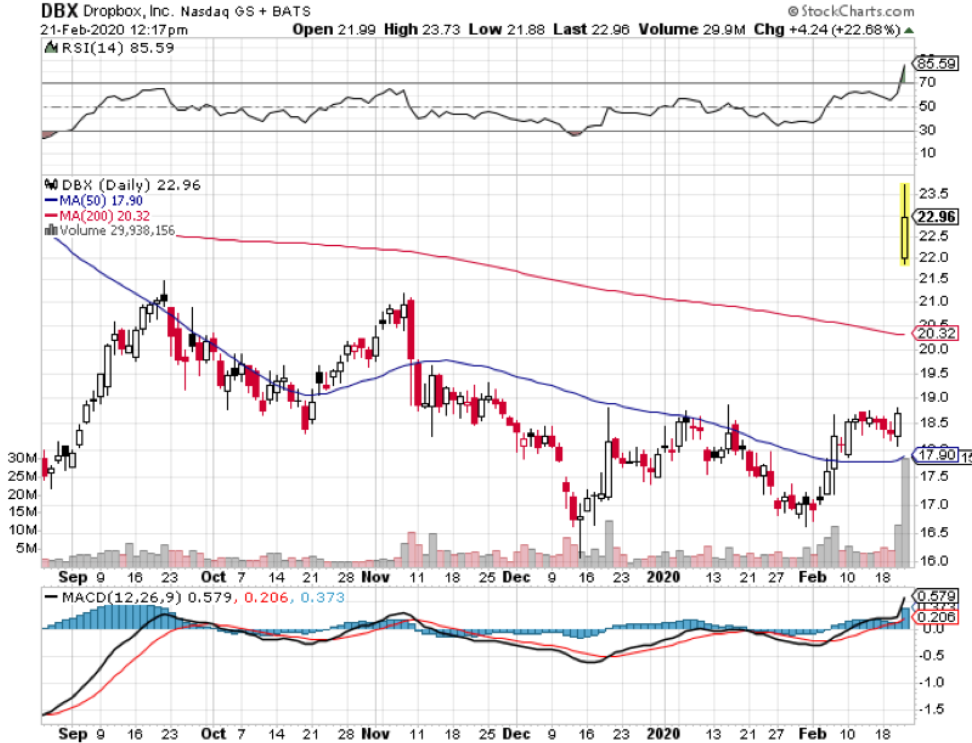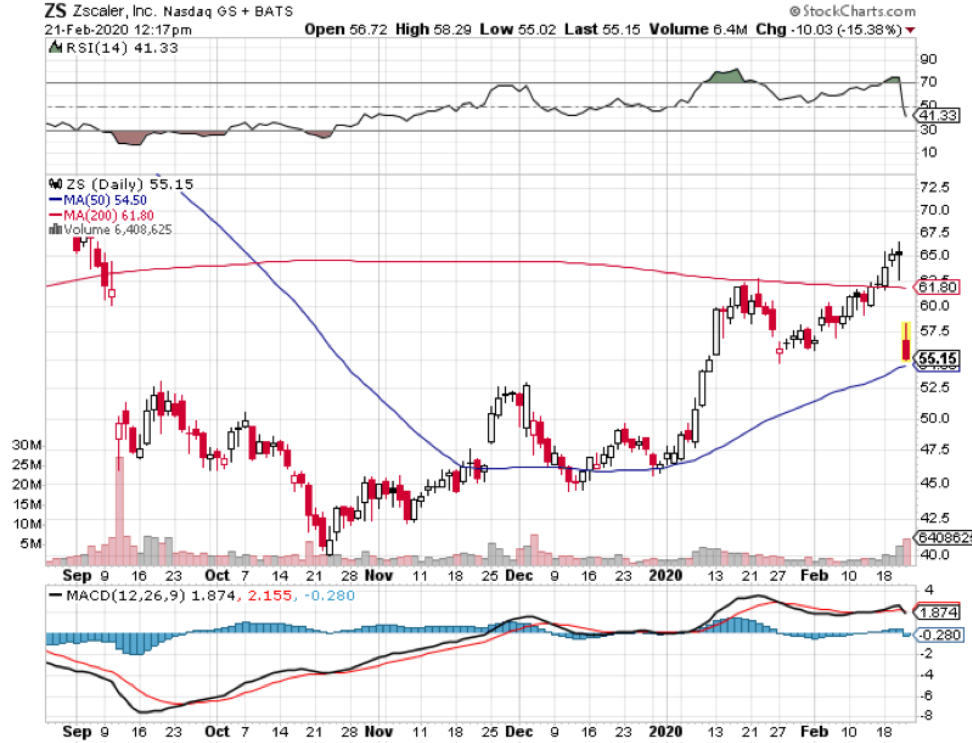“Your margin is my opportunity.” – Said Founder and CEO of Amazon Jeff Bezos
Mad Hedge Technology Letter
February 28, 2020
Fiat Lux
Featured Trade:
(THE TRUE COST OF THE CORONAVIRUS)
(COMPQ), (PYPL), (MSFT), (AMZN), (GOOGL)
Tech shares are hoping to stage a rebound after the coronavirus-fueled rout that saw the Nasdaq’s 2-day drop by 6.38%, which is its worst since June 2016.
Readers can now pencil in a fresh readjustment to growth expectations of zero to low single digits in tech shares for fiscal year of 2020.
That is why Thursday morning was greeted by another 3% drop at the open - proceed with caution to not get trapped in the proverbial dead cat bounce vortex in the short-term.
A major tech consolidation could take place because let’s get real, the unpredictability is having a major impact on technology companies and uncertainty is a substantial input in heightened risk.
What are the realistic scenarios that are still left on the table?
- Tech firms could slash prices, a deflationary element that promotes deteriorating profit margins seen as a net negative to revenue causing companies to miss revenue targets.
- Unsold inventory could lead to working capital issues crushing balance sheets for the smaller tech firms.
- Loss-making enterprise confront solvency issues if debt repayment hardship ripples through finance departments and could be a serious threat to credit markets as a whole.
Firms trading on the Nasdaq will slash price targets and profit estimates that could uncoil another leg down in the Nasdaq index.
In fact, it has already happened as PayPal (PYPL), Microsoft (MSFT), and Apple (AAPL) issued revenue warnings saying they do not expect to meet their revenue goals because of the coronavirus.
On an operational level, softness is what I see when delving into the semantics of Amazon (AMZN) whose ranking algorithm demotes product sellers who go out of stock.
The coronavirus has crippled supply chains, and to avoid a lack of stock, sellers are raising prices to slow sales, while planning to move production to other countries.
This is on top of the backbreaking supply problems that companies face because of the ill-effects of the trade war.
If the Amazon algorithm punishes the seller, once stock is replenished, they must overspend on advertising to climb back to the top of product searches.
The surveys I have taken out with Amazon sellers in the last few days show a precarious situation where sellers are stretched to the limit relying on numerous uncertain variables that are completely out of their control,
Even if the local government allows Chinese factories to restart, it will be understaffed while workers from other provinces self-quarantine.
The third-party marketplace accounts for more than half of Amazon’s retail sales with a robust base of manufacturers and sellers in China.
Google (GOOGL) and Microsoft are accelerating efforts to shift hardware production to Southeast Asia amid the worsening coronavirus outbreak, opening factories in Vietnam and Thailand as well.
Google is set to begin production of the Pixel 4A smartphone and also plans to manufacture its next-generation flagship smartphone called the Pixel 5 in Vietnam.
Google is also on the verge of building factories in Thailand for "smart home" related products, including voice-activated smart speakers like the Nest Mini.
Google and Microsoft’s plans are a giant shift away from their prior generation-long China manufacturing strategy and the coronavirus has only supported a strategy to remove China as a core manufacturing hub.
It is getting so bad in China that they are evaluating the feasibility and cost implications to uninstall some production equipment and ship it from China to Vietnam, literally packing up and taking their show on the road.
The have already initiated the process by asking a key sourcing contact to convert an old Nokia factory in the northern Vietnamese province of Bac Ninh to handle the production of Pixel phones.
Data center server production was also rerouted to Taiwan last year.
The coronavirus threat is only speeding up the move into South East Asia and Google and Microsoft hope to avoid the geopolitical risk in the region.
Remember that all of this rejigging of production will add costs and only the biggest can absorb mega hits to the balance sheets.
As for the coronavirus, business is becoming more complicated as the ban on Chinese nationals and flights from China could build barriers to business, and now South Korea has joined the list.
Korea’s Samsung Electronics, the world's largest smartphone maker, has operated a smartphone supply chain in northern Vietnam for years but still relies on some components made in China.
While there are many moving parts, the average investor needs to wait on optimal entry points.
Japan announced school shutdowns for a month and tech shares have only priced in the coronavirus eventually entering the U.S., but if there are mass shutdowns of American cities and schools, then tech shares will see another stinging sell-off.
The contagion could eventually lead to the Olympics in Tokyo being canceled, high-profile corporate management getting infected, and the Chinese economy being sidelined for most of 2020.
All of these events are highly negative to the global economy which is why potential risks have exploded through the roof in such a short time.
Slinging mud at the wall will not work in times like this, but this does have the makings of a once-in-a-year entry point into tech shares.
“Don't chase a girl, let the girl chase you.” – Said Founder of Softbank Masayoshi Son
Mad Hedge Technology Letter
February 26, 2020
Fiat Lux
Featured Trade:
(WHAT’S BEHIND THE TECH MELTDOWN)
(COMPQ)
Tech shares are on a knife’s edge.
The world finally cared about the coronavirus and this meant the spreading of it from Chinese soil to other regions of the world with meaningful foreign death tolls.
Tech shares, for a time, became the de facto safe haven for coronavirus investors to hide out until Iran and South Korea reported an explosion of cases on the same day.
Tech shares bore the brunt of the carnage in the markets and have experienced one of the worst 2-day performances in the history of the technology-dominated Nasdaq index.
Global supply chains are in a state of paralysis as the Middle Kingdom has turned into 1.4 billion homesitters.
Even worse, the rapid spread of the virus hits home the fact that other parts of the world could enter an imminent lockdown on business.
This is bearish for not only the standard tech multinational, but all global operations and economy.
Many tech traders were wiped out unable to sell in the frantic sell-off.
We will get the lowdown on how some tech-based hedge funds went bust shortly because more than a few bet on a quick coronavirus solution.
Well, this is not a 1-day fix and Mr. Market is always correct.
The truth is that this virus is sowing economic uncertainty across the globe and there are really 2 ways from here, will it get worse or better?
If further meaningful contagion is prevented in the next few days, there could be a massive rally in many of the best in show that tech has to offer.
However, that seems implausible.
If new cases vanish from the headlines for a few days, a relief rally will be on our hands, but there are reports as we speak from Austria, Spain, and Romania.
Investors are waiting for bullish crumbs like a Central Bank announcement or vaccine development to help, but that likely won’t stem the negative momentum or come in time.
The virus also destroys any potential tech IPOs this year such as Airbnb, and they will most likely shelve their IPO and wait for the virus and its fallout to dissipate.
The debt market will also be hesitant to give the benefit of the doubt to major loss-makers like Lyft and Uber who have poor unit economics.
Apple, Facebook, Amazon, Microsoft and Google-parent Alphabet comprise over 20% of the S&P and lost a combined $250 billion in one trading day then backed that up with an even worse loss.
Then there is the pending situation of if the Chinese economy isn’t up and running soon, “millions” of local businesses could go bust in the second biggest economy.
So even if a consensus thesis of stock markets usually powering through pandemics is still valid, the economic damage could be too hideous to ignore sending markets even lower.
One of the ironic winners of this horrid virus has been Bitcoin which has seen a price rise 15% in the last one month.
A global pandemic strengthens the use case for this “digital gold” almost signaling that the current governing status quo and monetary system are unfit for operation.
Now is not the time to dive in and bet the ranch.
The likelihood of the coronavirus halting tech’s ability to operate grows higher by the hour.
Risks are currently skewed to the downside with the market pricing into tech shares that the coronavirus will spread inside the U.S. and affect tech firms’ profitability for the rest of 2020 and even perhaps bring forward a global tech recession.
A tech recession is not yet off the table, and the policy response will be vital if the contagion spirals out of control.
The Mad Hedge Technology Letter is 100% in cash and readers should wait for the dip to bottom out.
“A.I. is probably the most important thing humanity has ever worked on.” – Said Alphabet CEO Sundar Pichai
Mad Hedge Technology Letter
February 24, 2020
Fiat Lux
Featured Trade:
()
(DBX), (ZS)
I have been adamant that 2020 is a time to be cherry-picking the best of the 2nd tier tech stocks like Twitter, eBay, Adobe, and Fortinet.
But investors must be aware that in the 2nd and 3rd tiers of the tech landscape, nothing is guaranteed, and the downside price action and the inflection points can be hard to swallow.
One stock that has been on both sides of the fence is cloud computing company Dropbox (DBX).
Dropbox shares exploded Friday morning up over 23% trending towards their best single-day performance.
Believers think this stock has finally shaken off the cobwebs.
Dropbox has it hard as it competes with the behemoths of Amazon, Google, and Microsoft for the same pie in the Cloud game.
To keep its head above water, they must tread harder than the bigger guns and the lack of traction in the past year doomed them to a -26% share return for investors.
Well, investors have gotten back their losses in one day and could close above its initial-public-offering price of $21 for the first time since September.
My underlying thesis of second-tier tech stocks either sinking or swimming partly has to do with the manner in which they are able to navigate against bigger companies who are in catch-and-kill mode via buyouts.
A highly bullish signal was when management at Dropbox decided to raise its operating-margin and free-cash outlook for 2020 and over the long term.
Superior operating margin was one of the hyped-up metrics that management tried to sell investors post-IPO but they never followed through and the stock cratered.
Dropbox has also revealed that higher margins will not be at the expense of cost cuts affecting the top line and has more to do with superior growth drivers which are always positive.
The new operating margin forecast for Dropbox is between 28% to 30% compared with a prior range of 20% to 22%, and that is a big deal.
There is a nuanced relationship between growth and profitability and Dropbox cannot lose sight of either because if top line misses badly, the operating margin beat is less meaningful.
At the bare minimum, the tone of the earnings report has investors chomping at the bit inciting a massive rally in shares and turning around the narrative for this once beleaguered company.
Many times the negativity can become a self-fulfilling prophecy.
It is difficult to break momentum in software stocks in either direction and now the onus is on Dropbox’s management to prove they can surpass margin forecasts or there could be a reverse 20% drop in the stock.
There are still bears out there who believe this wasn’t enough to convince them to change their mind.
Bears have cited a lack of sustained growth and a tendency to miss on subscriber numbers as the Achilles heel.
Because of the small nature of these companies, volatility goes hand in hand with their price action.
The Mad Hedge Technology Letter prefers to bundle itself with stocks that have more reliable price action.
A perfect example of volatility disturbing a stock would be a cybersecurity company that I have been quite bullish on named Zscaler (ZS).
The cloud security company delivered lighter-than-expected profit guidance for the third quarter and fiscal year and the stock slipped down 15%.
That would never happen to Google or Facebook shares in the same scenario.
Zscaler’s second-quarter report was robust and even had a billings’ beats of 15% year-over-year.
Meanwhile, hints of revenue deceleration and margin contraction in the second half were enough to kill shares in trading.
Traders who can filter through the bluster must time entry points in small-cap tech perfectly otherwise one mistimed word on an earnings report can sink a trade with no chance to exit.
Separating the wheat from the chaff is what we do here at the Mad Hedge Technology Letter.
“Our philosophy is that we care about people first.” – Said Founder and CEO of Facebook Mark Zuckerberg
Legal Disclaimer
There is a very high degree of risk involved in trading. Past results are not indicative of future returns. MadHedgeFundTrader.com and all individuals affiliated with this site assume no responsibilities for your trading and investment results. The indicators, strategies, columns, articles and all other features are for educational purposes only and should not be construed as investment advice. Information for futures trading observations are obtained from sources believed to be reliable, but we do not warrant its completeness or accuracy, or warrant any results from the use of the information. Your use of the trading observations is entirely at your own risk and it is your sole responsibility to evaluate the accuracy, completeness and usefulness of the information. You must assess the risk of any trade with your broker and make your own independent decisions regarding any securities mentioned herein. Affiliates of MadHedgeFundTrader.com may have a position or effect transactions in the securities described herein (or options thereon) and/or otherwise employ trading strategies that may be consistent or inconsistent with the provided strategies.














